Both Sides Do It: Voter Suppression Edition
Today, many states and municipalities are having elections that will mostly attract Democrats.
That Republicans have pursued a strategy of voter suppression through tactics such as making registration difficult, requiring photo identification at the polls, and barring convicted criminals from participating is well documented. Less well known, 538’s Eitan Hirsh notes, is how Democrats do it through championing off-year elections.
The election calendar in the United States is an insane mess. Exhibit A is New Jersey. New Jersey holds federal elections with the rest of the country on the first Tuesday after the first Monday in November of even-numbered years. But elections for state office in New Jersey are held in November of odd-numbered years. School district elections are held on the third Tuesday in April or else in November. And fire district commissioner elections are held on the third Saturday in February.
It isn’t just New Jersey. Most states — 44 out of 50 — hold some state and local elections off the federal cycle.
Why?
Political scientist Sarah Anzia, a professor at the University of California, Berkeley, gives a compelling explanation in an outstanding book published last year. The first point that Anzia makes is that the off-cycle election calendar is not a response to voter preferences; voters do not like taking multiple trips to the voting booth. Anzia asked a nationally representative sample of Americans if they prefer elections held at different times for different offices “because it allows voters to focus on a shorter list of candidates and issues during each election” or all at the same time “because combining the elections boosts voter turnout for local elections.” Voters of all political stripes prefer consolidated elections, and by wide margins. But that’s especially true for people who identify as Democrats, who prefer consolidated elections 73 percent to 27 percent.
Consolidation is popular, and during the decade-long period between 2001 and 2011 that Anzia studied, state legislatures across the country considered over 200 bills aimed at consolidating elections. About half, 102 bills, were focused specifically on moving school board election dates so that they would coincide with other elections. Only 25 became law.
The why is rather obvious:
Why do Democrats and Democratic-aligned groups prefer off-cycle elections? When school boards and other municipal offices are up for election at odd times, few run-of-the-mill voters show up at the polls, but voters with a particular interest in these elections — like city workers themselves — show up in full force. The low-turnout election allows their policy goals to dominate.
Anzia shows that off-cycle elections lead to higher salaries and better health and retirement benefits for teachers and public employees. Anzia studies these effects in many different ways. The simplest way is by looking at eight states that allow local governments to set their own election dates. She compares school districts that hold school board elections on-cycle and off-cycle within the same state. Controlling for factors that might make districts different from one another — like their population size, income, racial composition, partisan leanings and how urban or rural they are — Anzia found that the maximum base teacher salary is over 4 percent higher in districts with off-cycle elections.
What’s interesting is that both parties seem to be at least partly motivated by genuine ideological concerns in advocating voter suppression policies that just happen to favor their own interests:
As election law expert Rick Hasen has noted, there is a philosophical divide between the parties. Supposedly, for Republicans, small barriers to participation can help the functioning of a democracy. For instance, in recent years, Republicans have been pushing a requirement that voters present identification when they show up to cast a ballot. They argue that voter ID laws can prevent fraud and foster confidence in the electoral system. But they also argue that if an ID requirement deters people who aren’t particularly well-informed or invested in the political process, this might be a net benefit for the electoral system.
The Democratic philosophy is different. For Democrats, universal participation is a value: All voices ought to be represented in the electoral sphere, so the government should not put up any unnecessary barriers to participation.
[…]
Proponents of the off-cycle strategy argue that local issues get drowned out when local elections are held concurrent with presidential or congressional elections. People who show up to vote in those big elections may not be equipped to weigh in on the local issues. Anzia quotes a Texas school official who defends off-cycle elections because they bring out “an educated voter … people who really care about the issues and who are passionate about their district.” In off-cycle elections, proponents claim, the electorate is a concentrated set of voters who are engaged in the local issues, which yields better results for the community.
For readers who are sympathetic to the perspective of the off-cycle election proponents (typically Democrats), it is worth noting that these are very much the same arguments that Republicans might make in favor of voting restrictions that make voting a little bit harder for the average American. Just like voter ID or voter-registration requirements, off-cycle elections impose a cost on political participation. The cost is evidently high, since very few people participate in local elections when they are held in odd-numbered years. Maybe the cost leads to a more enlightened electorate. Or maybe it is Democratic-sponsored voter suppression.
I’ve long opposed off-year elections and always presumed that they were held for precisely the reasons Anzia cites—minus partisan interests. That is, there is an obvious advantage in scheduling referenda on niche issues and votes for less visible offices when only those most interested in them will bother to vote. That this group just happens to be employees of state and local governments—who happen to be overwhelmingly Democrats—is an interesting byproduct. (Indeed, that’s doubly true since government workers are almost always given time off from work to vote, a privilege not afforded to most in the private sector.)
While I think off-year—much less, off-off-year—elections are undemocratic and a burden on taxpayers, I’m actually sympathetic to making it less likely that low information voters will participate, especially in niche elections. While pretty much anyone who would bother to vote in a presidential election has a good idea of who the candidates are and what they stand for, that’s not true for school board, county commission, and other local elections. Further, while political party is a pretty good proxy for ideology at the national level, it’s not at the local level. Still, I don’t think this justifies making it more difficult for people to vote.
But the same is true for the types of suppression that Republicans tend to favor. I get why college towns would want to keep transient students from deciding their local ordinances, for example. Or why one would want to keep convicted felons and non-citizens from voting. And, while there’s essentially zero evidence of the sort of voting fraud that would be prevented by requiring photo ID exists at a level that would influence election outcomes (there are more effective, less risky ways of stuffing the ballot box) I get the visceral reaction to it, especially since most Republican voters can’t fathom why anyone wouldn’t have an ID card.
I’m a resident of Virginia, which is among the worst offenders. We hold our most important state and local elections in odd-numbered years. We elected our statewide officeholders in 2013. Today, we’re electing our state senators and delegates and Fairfax County, where I live, is electing our school board and the local government. If we get 20 percent turnout, I’ll be shocked.
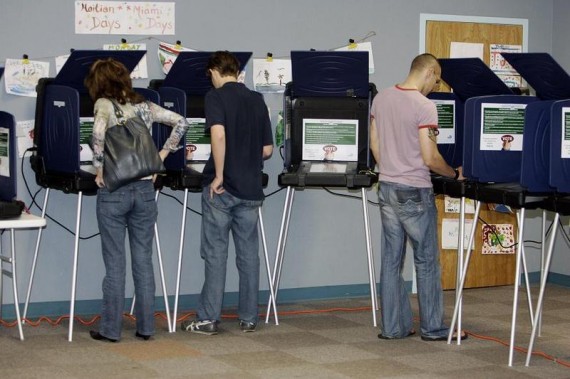

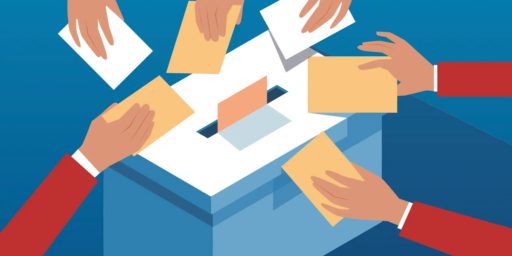
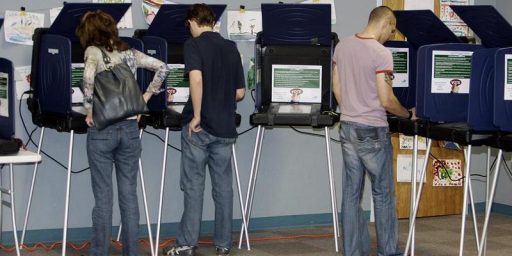
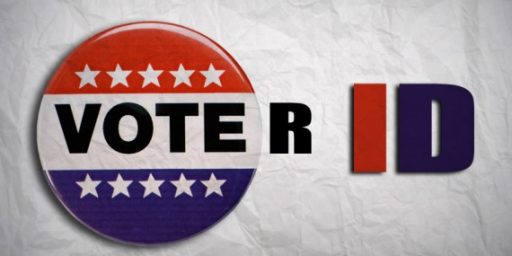
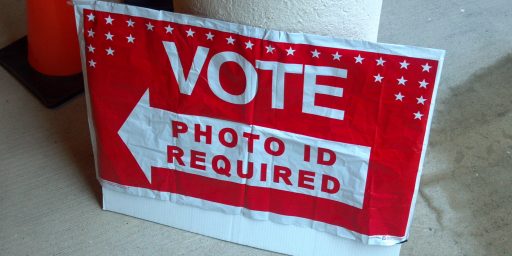
Wait…so election scheduling in 44 out of 50 states (88%) is a Democratic conspiracy???
Al Molinaro died this week.
Apparently…between Doug’s post and this one…OTB is jumping the shark in his memory.
I am skeptical. My reading of voter polls (both pre-election and exit polls) is that a higher percentage of Republicans than Democrats actually show up in off-year elections, as demonstrated by Congressional elections in non-Presidential years.
Well, incumbents want to win. How do they do this? Some schedule off-year elections. Others spread lies about voter fraud and whip up xenophobic/racist fears in order to pass laws intended to make it more difficult for poor African-Americans to vote.
Also, could someone explain why convicted felons should not vote. ‘Those people’ is not a reason.
I am unconvinced. First, I think an abuse of language is on display. Putting in structural, institutional barriers to voting is voter suppression. To call the timing of elections or the subject of elections voter suppression is really a stretch.
Second, I do see city councils and school boards take into consideration of timing for items like bond issues. It is not so much conniving as a desire to not have a lot of work go down the tubes when these mundane, but necessary, issues are drowned in the political noise.
Third, while I can see where there may be an advantage to off-cycle elections for special interests. I just don’t see it as unique to Democratic or liberal constituencies. Her in Texas, the religious right are quite effective in taking over small governing boards (such as school boards). This has been a tactic that the right wing of this country has been far more effective than Democrats who only seem to see national elections as being important.
Here in San Antonio, it does seem there is some election at least twice a year. More if there are runoffs. People do talk a lot about consolidation.
@C. Clavin: You’re getting beyond tiresome with this constant line of attack. It’s no more interesting than Superdestroyer’s “one party” trope. This is based on a long piece from 538, hardly a right wing site, which is in turn based on a scholarly book.
@Moosebreath: It’s true that off-year elections—that is, years when the House and a third of the Senate but not the White House are at stake—tend to favor Republicans. We’re talking here about off-cycle elections, conducted in odd-numbered years.
@Modulo Myself: I’m agnostic on restoring the vote to felons who have served their time. But I can see why people would think they’ve forfeited that particular aspect of their citizenship.
@Scott: The reason requiring ID is “suppression” is because it makes it slightly more difficult and disparately impacts those without transportation or who can’t take time off from work without being docked in pay or risk losing their job. The reason scheduling constant elections is suppression is that the opportunity cost is high and most people won’t accept it when it’s not a high-stakes election. In the case of local elections, special interests—government workers, schoolteachers, etc.—who have a high stake in the outcome will mobilize, quite possibly against the interests of the community as a whole.
@James Joyner:
“It’s true that off-year elections—that is, years when the House and a third of the Senate but not the White House are at stake—tend to favor Republicans. We’re talking here about off-cycle elections, conducted in odd-numbered years.”
I know. I suspect that the effect is even more pronounced in off-cycle elections than off-year ones. I’d like to see data on this before ascribing the retention of this practice to Democrats.
@James Joyner:
If society decides to release a person from prison, they are restored many rights. Why not voting?
@C. Clavin:
As has often been pointed out to Jenos, you are welcome to start your own blog. I think nearly every comment you’ve made for the past week has been about why the authors of this blog sucks for not covering topics you want/covering too many topics you don’t like/trying to actually analyze elections rather than yelling “ALL REPUBLICANS SUCK!”
To the topic at hand:
I was unaware that off-cycle elections were more of a Democratic thing. In Indiana, most (not all) city elections are off cycle. I believe we have around 150 mayoral elections throughout the state today. Indiana–like most states–is (relatively more) progressive in urban areas, conservative in the rural areas. So yeah, even in deep red Indiana this pattern should theoretically help Dems a bit.
Am I reading this right? You’re seriously making the argument that a trip to the polls once per YEAR is onerous and suppresses turnout in a similar fashion to the long-tradition of suppression the
whiteright has employed?In a word, no. There’s a huge and material difference between a strategy of holding elections on a workday and making people wait in a line 200 souls long after work to vote because precincts have been closed in black neighborhoods (if they have ID and haven’t upset the precinct officer too much), vs. lazy voters who can’t be bothered to get off the couch annually to vote their interests.
As a biographical note, I’ll mention that I lived in VA in the 90’s and the off-year elections there were new to me and somewhat irritating.
But if making them off-year was a strategy to promote the Democratic Party’s interests at the statewide level, I think we have to say that it was an abject failure, since both houses of the General Assembly are controlled by Republicans.
I can buy that this strategy works for municipalities and for school districts and other such bodies. I’m not seeing that it works at all at the state level.
Well, I think it’s fair to infer from what is happening in the states, and from this commentary, that Democrats apparently do not do voter suppression very well.
Republicans are in another league – the Major Leagues. In fact, about a year ago Republicans actually got the Supreme Court to rollback an important part of the Voting Rights Act.
James,
Reading the author’s work which 538 based its analysis on, she seems to have focused on which party was in power when the municipalities went to off-cycle elections (mostly in the 1800’s). Somehow, I don’t view that as terribly supportive of anything now, especially given how the parties have generally changed which groups vote for which party since then.
This analysis is more like where my understanding lies:
“Implementing this approach, I estimate that regular voters in gubernatorial elections (who would have voted regardless of timing) support Democratic candidates 47 percent of the time, while marginal voters support Democrats 68 percent of the time. This means there is a 21 percentage point gap in the partisan preferences of regular and marginal voters. Furthermore, this difference is enough to tip the results of many elections. Controlling for other factors, on-cycle states are 45 percentage points more likely to elect Democratic governors than off-cycle states, despite the fact that they vote identically in presidential races.”
It is an eternal mystery to me why someone in South Suburban Americanville thinks that the local town board or the local school district is low impact. They probably have an order of magnitude more effect on you than whether Obama or Romney is president. And I have a certain sympathy for those politicians and district administrators who feel these issues are important and want an adequate public discussion before voters start voting. In my school district, the budget gets extensive debate in the local media. If it were held with the Presidential election, not so much.
@James Joyner:
Here’s Pennsylvania Republican House Leader Mike Turzai in 2012:
Find me a quote about off-year elections that justifies “both sides do it”.
Go ahead….
There is a huge difference between something that happens for a variety of mostly unrelated reasons, and a concerted effort.
@Neil Hudelson:
You are right…clearly, by the article, Democrats are conspiring to intentionally suppress Republican votes.
Both Sides Do It
http://rationalwiki.org/wiki/Balance_fallacy
@MarkedMan:
That’s a good question. Part of the answer may have to do with the fact that a lot of suburbanites today are transients. They live in an upscale town for a few years, then Mom or Dad gets a better job elsewhere, and they move on to another nice suburb in another state. So they have no real commitment to wherever it is they’ve landed temporarily. If they send their kids to boarding school, as many do, they have no interest in who might be elected to the local school board. They might not even bother to vote on property tax hikes, since they won’t be around long enough for a hike to have much effect on them.
@C. Clavin:
*re-reads my posts*
Yup, nothing in there about Dems conspiring to intentionally suppress Republican votes. Do you want to respond to something I actually wrote, or are you still finishing off that straw man?
@Neil Hudelson:
Neil…it’s simple math. Republicans are widely acknowledged to be actively suppressing votes…
The headline above screams “Both Sides Do It”.
That implies Democrats are actively suppressing votes.
Kinda defies the so-called analysis you referenced.
This is obviously true. And while off-cycle elections see lower participation, nothing is actually preventing voters from going to the polls.
Meanwhile, proponents of voter-ID and other vote restriction efforts argue that election fraud is rampant but can provide zero evidence of it.
538 completes its decent into Slate-style contrarianism.
First, it seems like a lot of states have some kind of laws on the books protecting employees who want to go vote. Not all, no, but many:
http://www.findlaw.com/voting-rights-law.html
Next, I agree with those who note that an “inconvenient” election day is not quite on par with the active voter suppression attempts we’ve seen in recent years.
Finally, I’d note that for a time, I worked in Republican party politics (no longer my affiliation). The state I lived in had a bunch of special elections for state house and state senate seats. These were all weird timing, called by the Democratic governor (elections were held 10 weeks from the time in which they were called). We ended up pretty much running the board, winning almost every open seat, because the Republicans, at that time, had a better GOTV effort and better voter data. I’ll add this was following the 1992 elections, which wasn’t really a spectacular year for Republicans.
Anecdotes are not data, I understand that. But really, a lot of this does boil down to GOTV efforts, not inconvenient timing.
If off-year elections is a “voter suppression” tool of the Democrats, it apparently needs some work:
https://www.washingtonpost.com/news/powerpost/wp/2015/11/04/the-daily-202-from-coast-to-coast-conservatives-score-huge-victories-in-off-year-elections/